Looking-Glass House
Studies in Alice XIII, by Marc Edmund Jones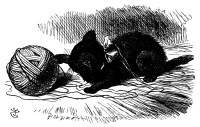
This lesson considers the first chapter of Through the
Looking Glass and the thirteenth great principle of
wisdom in the Philosophy of Concepts as revealed
through the adventures of Alice is that actuality is the
function of present constitution. This is the familiar
occult and metaphysical insistence on the supremacy of
the here and now and the equally familiar affirmation of
the possibility of conscious control of all circumstances
and contributing factors of life. Nevertheless the
principle is more scientific fact than philosophical
theory and for that reason its exact demonstration on the
one hand and its slow but steady growth into general
popular acceptance on the other is to be noted in the
practical world of every day rather than in the field of
abstract thought.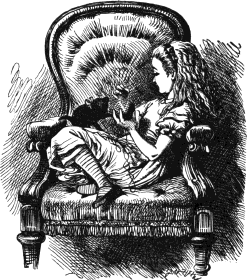 This is correct and proper because
the function of philosophy both academic and occult is
to direct and guide thought and understanding rather than to create it and in the Philosophy of
Concepts the aspirant is sent out into the world constantly for proof and practice of his
understanding. The principle of actuality will be found in many forms throughout the lessons in
all these series, and already in the present course the foundation of everything in the familiar has
been stressed several times. What is important at the beginning of this second half of the Alice
studies is realization of the unity in identity of all familiar things whether philosophic or
scientific, ideative or matter of fact and theoretical or practical. In metaphysical study the here
and now is a realization, and actuality in life is gained through inner comprehension made
effective through the attitude of man toward life and its affairs. In scientific study the same
actuality is gained through demonstration of the extension of reality in time and space. This is
the point brought out particularly in the second paragraph of the eighth lesson when reality in any
center is shown to be increased by the tying of all other things thereto in terms of both duration
and relationship.
This is correct and proper because
the function of philosophy both academic and occult is
to direct and guide thought and understanding rather than to create it and in the Philosophy of
Concepts the aspirant is sent out into the world constantly for proof and practice of his
understanding. The principle of actuality will be found in many forms throughout the lessons in
all these series, and already in the present course the foundation of everything in the familiar has
been stressed several times. What is important at the beginning of this second half of the Alice
studies is realization of the unity in identity of all familiar things whether philosophic or
scientific, ideative or matter of fact and theoretical or practical. In metaphysical study the here
and now is a realization, and actuality in life is gained through inner comprehension made
effective through the attitude of man toward life and its affairs. In scientific study the same
actuality is gained through demonstration of the extension of reality in time and space. This is
the point brought out particularly in the second paragraph of the eighth lesson when reality in any
center is shown to be increased by the tying of all other things thereto in terms of both duration
and relationship.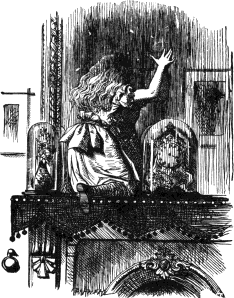
Here is the principle of consciousness or actual awareness in and through gradation of reality. While reality exists beyond comparison with any separation from itself it is nevertheless manifest in successive revelations of itself by grades of contrast with the separation in illusion that creates it for the one to whom it is known in a semblance of gradation. It is always different beyond the seen and the known. To the reality that is, the greater reality obviously is unreal or different and because of this fact the element of simple or abstract difference has been stressed through realms of spiritual development for untold millennia. Even the orthodox Christian of supposedly universal faith is exhorted to be different from his fellows. The symbolism of the first chapter of Looking Glass is interesting therefore in its portrayal of the subjective realm just beyond. Those things that could be seen through the glass are merely reversed and this is naturally the first stage in evolution of higher understanding. An aspirant restrains rather than indulges his appetites. He enhances his consciousness at night at the expense of his daily awareness. He tries to interest himself most in what the world regards as of least importance as in taking up obscure causes to champion and so on. But as Alice realizes immediately the reversing of yessing lower domain of the subconscious is the least interesting, and she hastens to investigate the just-beyond-realm that marks an actual and real extension of consciousness. Here everything is alive and is not so much an actuated reflection as a self-actuating reality. When the aspirant learns not to look to spiritual things with the idea of seeing or knowing them in terms of comprehension projected or reflected from the plane of lower being, then and then only is he able to build up subjective reality independent of physical self. So far as Alice is concerned the journey through the looking glass is brought about by her play with the kitten. Astrologically this is suggestive, since Leo rules the seat of the ego, but fundamentally it is Alice's contribution to self-actuating life on the lower physical plane that opens the gate to the higher or wholly self-actuating subjective realm. As man here and now can create what will live and persist of itself, so does he become in fact a creator or a group spirit enabled to enter Looking Glass House.
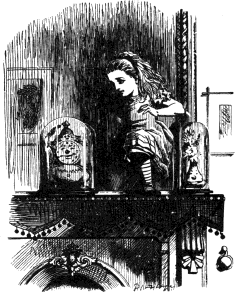 The achievement of imagination in the chapter, or the
thirteenth great scientific anticipation, is the revelation of
the practical operation of the fourth dimension. This is
the scientific method in an accounting for the unknown,
and it is not only logical and satisfying to the most
rigorous dictates of reason but it is known to the occultist
to be correct because of the investigation possible to him
with superphysical faculties. To gain the idea it is
necessary to take a dimensional step backward in
imagination and to visualize a world in which only two
dimensions exist. A number of quite clever stories have
been based on this conceit. In Flatland, as one writer
terms this realm, there is no possible sensual cognition of
separation from the plane surface on which
two-dimensional life takes place and it is necessary for
individuals to maneuver around and jockey for position
on this plane surface in a manner paralleled by an
automobile that must pass around all obstacles.
The achievement of imagination in the chapter, or the
thirteenth great scientific anticipation, is the revelation of
the practical operation of the fourth dimension. This is
the scientific method in an accounting for the unknown,
and it is not only logical and satisfying to the most
rigorous dictates of reason but it is known to the occultist
to be correct because of the investigation possible to him
with superphysical faculties. To gain the idea it is
necessary to take a dimensional step backward in
imagination and to visualize a world in which only two
dimensions exist. A number of quite clever stories have
been based on this conceit. In Flatland, as one writer
terms this realm, there is no possible sensual cognition of
separation from the plane surface on which
two-dimensional life takes place and it is necessary for
individuals to maneuver around and jockey for position
on this plane surface in a manner paralleled by an
automobile that must pass around all obstacles.
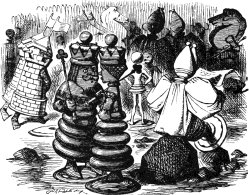 If a three-dimensional being should lift a
two-dimensional individual over an obstruction and
replace him on a plane surface of cognition on the other
side, this phenomenon to Flatland individuals including
the one so lifted would be a disappearance or temporary
annihilation followed by a reappearance or a most
baffling magic. The present-day space conceptions of
science show the boundaries of our existence to be
dimensional and to deal with cognition. Therefore
magic is seen at least to mark not a transcendence of
natural law but a transcendence of the ordinary
limitations of cognition and hence it is explainable.
If a three-dimensional being should lift a
two-dimensional individual over an obstruction and
replace him on a plane surface of cognition on the other
side, this phenomenon to Flatland individuals including
the one so lifted would be a disappearance or temporary
annihilation followed by a reappearance or a most
baffling magic. The present-day space conceptions of
science show the boundaries of our existence to be
dimensional and to deal with cognition. Therefore
magic is seen at least to mark not a transcendence of
natural law but a transcendence of the ordinary
limitations of cognition and hence it is explainable.
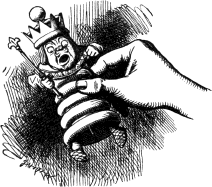 The symbolism of an invisible Alice
playing fourth dimension to the poor
three-dimensional chess pieces is
fascinating, as in Alice's own astral
flight down the stairs. Throughout
this opening chapter there are strange
transpositions of reality as in the
pieces climbing the fender and sliding
down the poker. All cognition is in
terms of an individual's own reality and while he cannot
project mundane reality into subjective realms without
The symbolism of an invisible Alice
playing fourth dimension to the poor
three-dimensional chess pieces is
fascinating, as in Alice's own astral
flight down the stairs. Throughout
this opening chapter there are strange
transpositions of reality as in the
pieces climbing the fender and sliding
down the poker. All cognition is in
terms of an individual's own reality and while he cannot
project mundane reality into subjective realms without 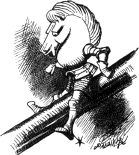 gaining but a senseless echo of a lower in a higher reality where this is not real, yet it is equally
true that the interpretation of higher experiences to the lower realm or being must be in terms of
the latter's reality. Thus the invisible Alice was a volcano to the queen, and the fender and poker
remained fender and poker to Alice when the pieces referred to them. Thus the reality in words
and things is placed in them by the cognizing agency but subjective reality is apart from the
words and the things it interprets.
gaining but a senseless echo of a lower in a higher reality where this is not real, yet it is equally
true that the interpretation of higher experiences to the lower realm or being must be in terms of
the latter's reality. Thus the invisible Alice was a volcano to the queen, and the fender and poker
remained fender and poker to Alice when the pieces referred to them. Thus the reality in words
and things is placed in them by the cognizing agency but subjective reality is apart from the
words and the things it interprets.
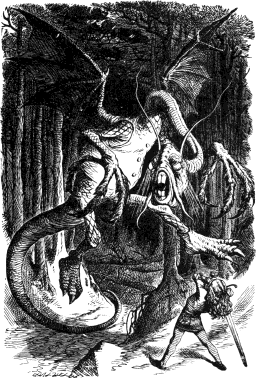 The law of applied psychology, or the thirteenth big
idea for the solution of personal problems, is brought
out in the technique of any self-expression above the
pure habitual state. The activity of the subliminal self
is seen symbolized by Alice showing the actuality of
compulsion from the invisible. Men are disinclined
to recognize what they send forth when it returns to
them, but Lewis Carroll's foreshadowing of automatic
writing shows excellently the impression on
consciousness invited by the king and also the
mischievousness in this forced or nonindividualized
consciousness or the regal chess piece. The student
must learn to FORGET IT, because the idle harping
on things in consciousness merely gives power to the
caprice of the group intelligence.
The law of applied psychology, or the thirteenth big
idea for the solution of personal problems, is brought
out in the technique of any self-expression above the
pure habitual state. The activity of the subliminal self
is seen symbolized by Alice showing the actuality of
compulsion from the invisible. Men are disinclined
to recognize what they send forth when it returns to
them, but Lewis Carroll's foreshadowing of automatic
writing shows excellently the impression on
consciousness invited by the king and also the
mischievousness in this forced or nonindividualized
consciousness or the regal chess piece. The student
must learn to FORGET IT, because the idle harping
on things in consciousness merely gives power to the
caprice of the group intelligence.

Sabian.org





